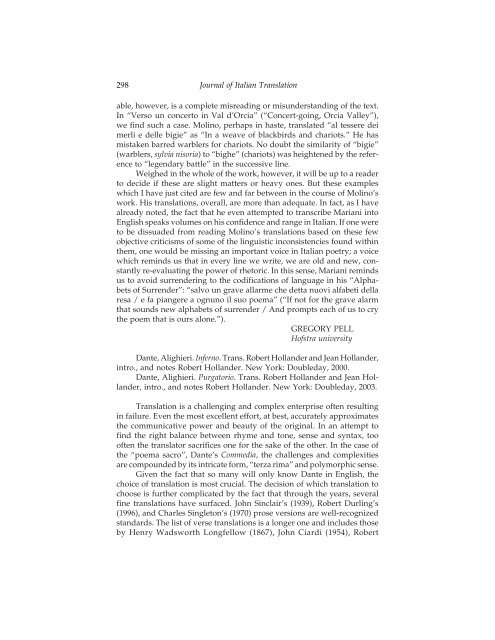Journal of Italian Translation
Journal of Italian Translation
Journal of Italian Translation
Create successful ePaper yourself
Turn your PDF publications into a flip-book with our unique Google optimized e-Paper software.
298<br />
<strong>Journal</strong> <strong>of</strong> <strong>Italian</strong> <strong>Translation</strong><br />
able, however, is a complete misreading or misunderstanding <strong>of</strong> the text.<br />
In “Verso un concerto in Val d’Orcia” (“Concert-going, Orcia Valley”),<br />
we find such a case. Molino, perhaps in haste, translated “al tessere dei<br />
merli e delle bigie” as “In a weave <strong>of</strong> blackbirds and chariots.” He has<br />
mistaken barred warblers for chariots. No doubt the similarity <strong>of</strong> “bigie”<br />
(warblers, sylvia nisoria) to “bighe” (chariots) was heightened by the reference<br />
to “legendary battle” in the successive line.<br />
Weighed in the whole <strong>of</strong> the work, however, it will be up to a reader<br />
to decide if these are slight matters or heavy ones. But these examples<br />
which I have just cited are few and far between in the course <strong>of</strong> Molino’s<br />
work. His translations, overall, are more than adequate. In fact, as I have<br />
already noted, the fact that he even attempted to transcribe Mariani into<br />
English speaks volumes on his confidence and range in <strong>Italian</strong>. If one were<br />
to be dissuaded from reading Molino’s translations based on these few<br />
objective criticisms <strong>of</strong> some <strong>of</strong> the linguistic inconsistencies found within<br />
them, one would be missing an important voice in <strong>Italian</strong> poetry; a voice<br />
which reminds us that in every line we write, we are old and new, constantly<br />
re-evaluating the power <strong>of</strong> rhetoric. In this sense, Mariani reminds<br />
us to avoid surrendering to the codifications <strong>of</strong> language in his “Alphabets<br />
<strong>of</strong> Surrender”: “salvo un grave allarme che detta nuovi alfabeti della<br />
resa / e fa piangere a ognuno il suo poema” (“If not for the grave alarm<br />
that sounds new alphabets <strong>of</strong> surrender / And prompts each <strong>of</strong> us to cry<br />
the poem that is ours alone.”).<br />
GREGORY PELL<br />
H<strong>of</strong>stra university<br />
Dante, Alighieri. Inferno. Trans. Robert Hollander and Jean Hollander,<br />
intro., and notes Robert Hollander. New York: Doubleday, 2000.<br />
Dante, Alighieri. Purgatorio. Trans. Robert Hollander and Jean Hollander,<br />
intro., and notes Robert Hollander. New York: Doubleday, 2003.<br />
<strong>Translation</strong> is a challenging and complex enterprise <strong>of</strong>ten resulting<br />
in failure. Even the most excellent effort, at best, accurately approximates<br />
the communicative power and beauty <strong>of</strong> the original. In an attempt to<br />
find the right balance between rhyme and tone, sense and syntax, too<br />
<strong>of</strong>ten the translator sacrifices one for the sake <strong>of</strong> the other. In the case <strong>of</strong><br />
the “poema sacro”, Dante’s Commedia, the challenges and complexities<br />
are compounded by its intricate form, “terza rima” and polymorphic sense.<br />
Given the fact that so many will only know Dante in English, the<br />
choice <strong>of</strong> translation is most crucial. The decision <strong>of</strong> which translation to<br />
choose is further complicated by the fact that through the years, several<br />
fine translations have surfaced. John Sinclair’s (1939), Robert Durling’s<br />
(1996), and Charles Singleton’s (1970) prose versions are well-recognized<br />
standards. The list <strong>of</strong> verse translations is a longer one and includes those<br />
by Henry Wadsworth Longfellow (1867), John Ciardi (1954), Robert
















